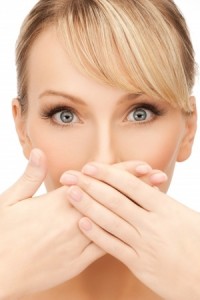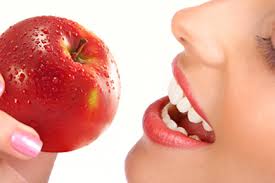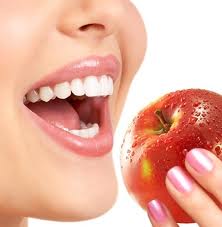5 Amazing Foods that Make Your Breath Smell Great
June 23rd, 2016
 Food products like garlic and onion are known to cause bad breath. But did you know that some foods can actually help your breath smell good? It’s true. Mints aren’t the only solution to a stinky mouth. Here are five foods that can actually make your breath smell great!
Food products like garlic and onion are known to cause bad breath. But did you know that some foods can actually help your breath smell good? It’s true. Mints aren’t the only solution to a stinky mouth. Here are five foods that can actually make your breath smell great!
Dairy
Dairy isn’t just great for your pearly whites. Dairy products like yogurt and cheese are also pretty good at fighting off bad breath. Cheese neutralizes acids after you’ve eaten, making sure that they don’t give off any sour smells. Probiotic yogurts with live active cultures can reduce sulfite compounds in your mouth that cause bad breath. The vitamin D in these yogurts also reduces smelly mouth bacteria.
Crunchy Apples and Celery
An apple a day keeps the smell away. Crisp and crunchy foods like apples and celery actually clean your teeth, removing soft and sticky food that’s stuck there. These foods can also push plaque away from your teeth when you bite into them. Just because they do some scrubbing doesn’t mean you should skip brushing or flossing. But apples and celery are a great snack between meals to keep your mouth smelling fresh.
Fennel Seeds
Fennel seeds are extremely flavorful and aromatic, so it’s no surprise they can keep bad breath at bay. These seeds work to neutralize bad smells in your mouth. But along with that, they actually have antibacterial properties, giving them the power to fight off bacteria that causes bad breath.
Ginger
If you’ve ever taken a bite out of ginger, you know it packs a punch. Ginger is regularly used to clean your palate. And it also gets rid of bad breath with its powerful flavor. Just make sure you like the flavor of ginger before you bite into it or make a drink with it, because you can’t plug your nose to escape its flavor.
Fruits That Pack a Lot of Vitamin C
Along with keeping your body healthy, vitamin C keeps bad breath away. The bacteria that causes bad breath can’t actually grow very well in environments filled with vitamin C. Fruits that also contain a lot of water, like melons and citrus fruit, can wash rotting food and bacteria away. Try eating strawberries, cantaloupe or oranges next time you notice your breath smelling funky.
We hope you give these foods a try next time you have bad breath. If you can’t seem to get rid of the smell, feel free to contact Water Tower Dental Care. If you have a dental issue causing your bad breath, we’ll get to the bottom of it!

 Just because something is good for you doesn’t mean it’s good for your teeth. There’s a wide variety of food that nutritionists would consider healthy for you, but that can damage your teeth if you’re not careful. Here are the top 6 healthy foods that are surprisingly bad for your teeth.
Just because something is good for you doesn’t mean it’s good for your teeth. There’s a wide variety of food that nutritionists would consider healthy for you, but that can damage your teeth if you’re not careful. Here are the top 6 healthy foods that are surprisingly bad for your teeth. Many people who wear braces are worried about keeping their teeth white. After all, cleaning your teeth is much more difficult with braces, and you can’t really use teeth-whitening products on the part of your teeth that’s covered up. What you can do, though, is prevent your teeth from discoloring. Find out how to do this with these 11 easy tips from our dental experts.
Many people who wear braces are worried about keeping their teeth white. After all, cleaning your teeth is much more difficult with braces, and you can’t really use teeth-whitening products on the part of your teeth that’s covered up. What you can do, though, is prevent your teeth from discoloring. Find out how to do this with these 11 easy tips from our dental experts. A large percentage of Americans suffer from bad breath. While good oral hygiene can help keep bad breath at bay, sometimes a mouth needs to take further measures to help keep it from smelling too bad. Today we'd like to discuss a few natural ways to help reduce bad smelling breath.
A large percentage of Americans suffer from bad breath. While good oral hygiene can help keep bad breath at bay, sometimes a mouth needs to take further measures to help keep it from smelling too bad. Today we'd like to discuss a few natural ways to help reduce bad smelling breath. There are a lot of conflicting opinions if apples are good for your teeth or not. Seems odd that it’s even a question. How could the fruit recommended to keep the doctor away hurt you? A few years back, the Toronto Star published some negative
There are a lot of conflicting opinions if apples are good for your teeth or not. Seems odd that it’s even a question. How could the fruit recommended to keep the doctor away hurt you? A few years back, the Toronto Star published some negative  However, though apples can hurt your teeth, their benefits greatly outweigh the risk. Not only can apples help our teeth, they can help regulate our blood sugar, are low in calories and are a great source of dietary fiber. The negative effects of apples are easily preventable and mostly depend on your apple eating habits. If you want the good benefits of apples without the negative impact, follow these steps:
However, though apples can hurt your teeth, their benefits greatly outweigh the risk. Not only can apples help our teeth, they can help regulate our blood sugar, are low in calories and are a great source of dietary fiber. The negative effects of apples are easily preventable and mostly depend on your apple eating habits. If you want the good benefits of apples without the negative impact, follow these steps:




 Website Powered by Sesame 24-7™
Website Powered by Sesame 24-7™